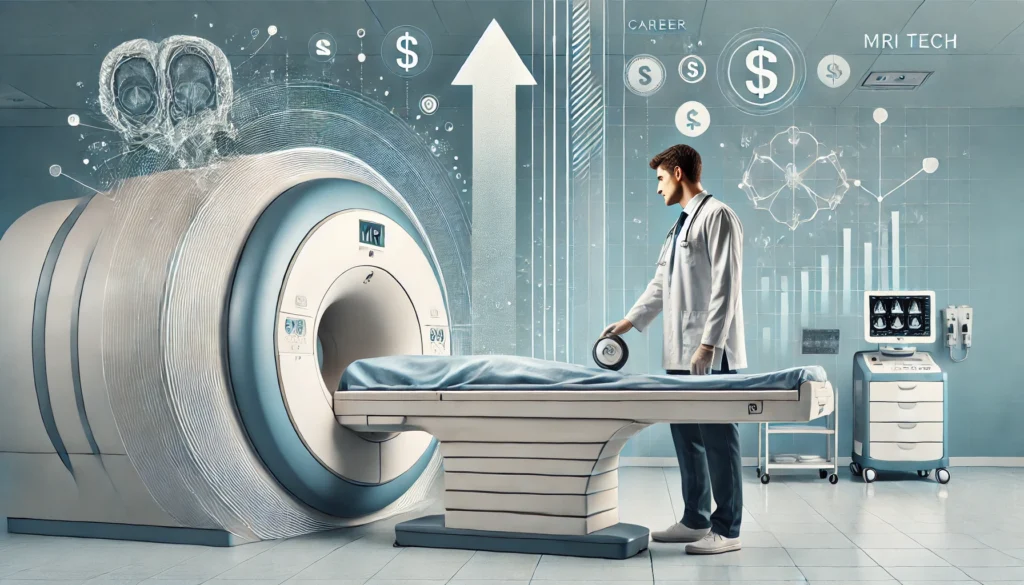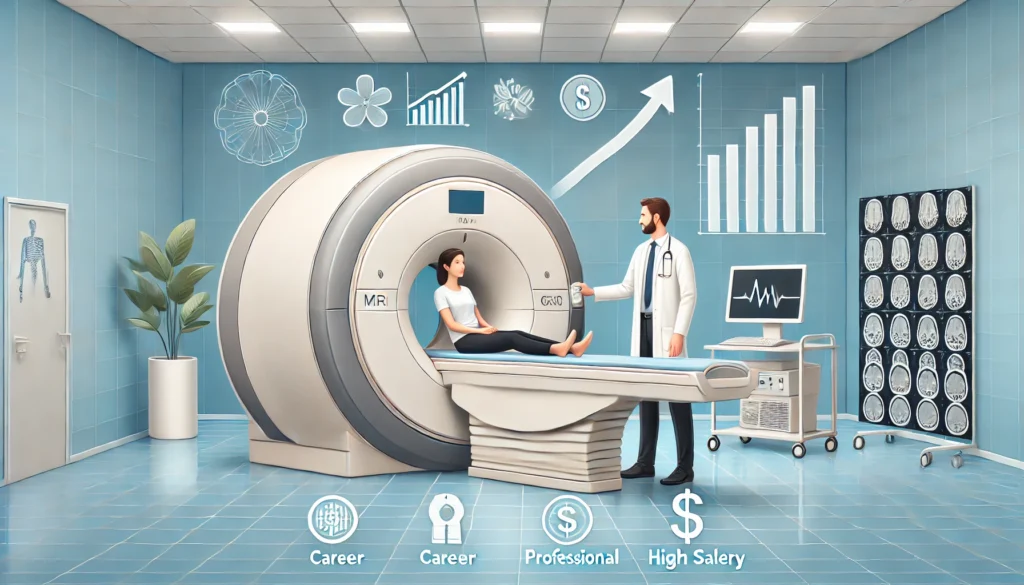Introduction
The demand for MRI technologists is growing as diagnostic imaging becomes an essential tool in modern healthcare. According to the U.S. Bureau of Labor Statistics, the employment of MRI technologists is expected to grow by 9% by 2030. With this rise in demand comes the opportunity for MRI techs to increase their salary without necessarily working more hours.
This blog post will explore actionable strategies to help MRI technologists boost their income, land high-paying jobs, and enhance their career prospects.

Factors Influencing MRI Tech Salaries
Before diving into specific salary-boosting tactics, it’s important to understand the key factors that influence MRI tech salaries. Knowing these variables can help you tailor your approach to maximize earnings.
1. Experience
Experience is one of the most significant factors in determining MRI tech salary. As you gain more hands-on experience, employers will likely offer higher pay. Technicians with five or more years of experience earn significantly more than entry-level professionals.
2. Certifications
In the medical imaging field, specialized certifications are invaluable. MRI techs with additional certifications—such as those from the American Registry of Radiologic Technologists (ARRT)—can demand higher salaries. Some certifications worth considering include:
- MRI Safety (MRSE)
- Advanced Cardiac Imaging
- MRI in Neuroimaging
3. Geographic Location
Salaries for MRI techs vary widely depending on geographic location. States with higher living costs, like California and New York, often offer higher pay. However, rural or underserved areas may also offer competitive salaries as part of incentive programs.
4. Employer Type
The type of healthcare facility can also affect your salary. MRI techs working in large hospitals or specialized diagnostic centers may earn more than in smaller clinics or outpatient care centers.

How to Increase Your MRI Tech Salary
1. Pursue Advanced Certifications
One of the quickest ways to increase your salary is to pursue advanced certifications. Consider obtaining certifications in specialized areas like musculoskeletal MRI, functional MRI (fMRI), or pediatric MRI. These credentials can set you apart from other technicians and allow you to negotiate a higher salary. Certification programs are typically short and can often be completed online, making them an efficient way to boost your qualifications.
2. Explore Different Locations
If you’re open to relocating, consider exploring different geographic regions where MRI techs are in high demand. Some states may offer better compensation, especially those with fewer MRI technicians or higher healthcare demands. States like California, Massachusetts, and Washington are known for offering some of the highest MRI tech salaries.
You can also consider contract positions in rural or underserved areas, where healthcare facilities often provide incentives like housing stipends or signing bonuses.
3. Network Within the Healthcare Industry
Networking can be a powerful tool for career advancement. Joining professional organizations, attending medical conferences, and connecting with other healthcare professionals can open doors to high-paying job opportunities.
Consider joining organizations like:
- The American Society of Radiologic Technologists (ASRT)
- The International Society for Magnetic Resonance in Medicine (ISMRM)
These groups often have job boards, educational resources, and networking events that can help you advance in your career.

4. Specialize in a High-Demand Field
Specialization is another effective way to increase your earning potential. As an MRI tech, you can choose to specialize in fields like cardiology, oncology, or neuroimaging, where there is a growing demand for diagnostic imaging. These specialties often come with higher salaries and more job opportunities.
5. Negotiate Your Salary
Many MRI techs overlook the importance of salary negotiation. Don’t hesitate to negotiate, whether you’re starting a new job or looking for a raise. Research the average salary for MRI techs in your region and with your level of experience. Come to the table armed with data and a clear list of your qualifications, certifications, and achievements.
6. Take on Leadership Roles
Consider advancing to supervisory or leadership roles within your department. Management positions in diagnostic imaging departments tend to offer significantly higher pay. As a supervisor or manager, you’ll oversee a team of MRI technologists, manage equipment, and ensure regulatory compliance.
High-Paying MRI Tech Jobs
If you’re looking to land a high-paying MRI tech job, here are some job titles to consider:
- Lead MRI Technologist: Supervises other MRI techs, manages schedules, and ensures imaging quality.
- Radiology Supervisor: Oversees the entire radiology department and ensures all procedures follow guidelines.
- Cardiac MRI Technologist: This specialist specializes in imaging the heart and cardiovascular system, which often demands a higher salary due to the complexity of the work.
- MRI Safety Officer: Focuses on maintaining safety protocols within MRI facilities, a critical and well-paid role.

Top Cities for MRI Tech Salaries
- San Francisco, CA: High demand and high cost of living make this city one of the best-paying locations for MRI techs.
- New York, NY: New York City offers competitive salaries for MRI techs, especially those with advanced certifications.
- Boston, MA: Home to some top hospitals and medical schools, Boston is a lucrative location for MRI techs.
- Houston, TX: Texas has a growing healthcare sector, and cities like Houston offer attractive salaries for MRI techs.
- FAQ
- 1. How much do MRI techs earn on average?
- MRI techs earn an average annual salary of $75,000, varying significantly based on experience, location, and certifications.
- 2. What certifications should MRI techs consider?
- ARRT certifications, especially advanced certifications in specific imaging areas like cardiac or neuroimaging, are highly recommended for MRI techs looking to increase their salary.
- 3. Can I increase my MRI tech salary without relocating?
- You can increase your salary by obtaining advanced certifications, taking on leadership roles, and negotiating your pay at your current location.
- 4. How long does it take to become a specialized MRI tech?
- Depending on the program, specialized certifications can often be completed in a few months. This makes specialization an efficient way to boost your qualifications and salary.
- 5. What are some of the highest-paying MRI tech jobs?
- Lead MRI technologist, radiology supervisor, cardiac MRI technologist, and MRI safety officer are some of the highest-paying roles in the field.
- Conclusion
- MRI technologists have excellent opportunities to increase their income through advanced certifications, specialization, and salary negotiation. By following the strategies outlined in this post, MRI techs can take control of their careers and maximize their earning potential without needing extra hours.







